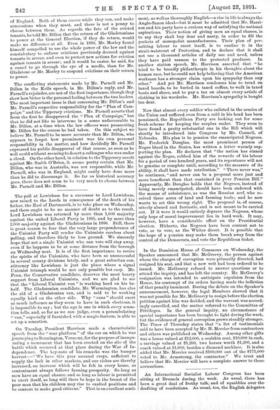On Tuesday, President Harrison made a characteristic speech from the
"rear platform" of the car on which he was journeying to Bennington, Vermont, for the purpose of inaugu- rating a monument that has been erected on the site of the battle which occurred at that place during the War of In- dependence. The key-note of his remarks was the bumper harvest :—" We have this year unusual crops, sufficient to supply the lack in other markets, and our riches are thereby increased, an increase which will be felt in every home, as contentment always follows farming prosperity. So long as men have an equal chance, and so long as labour is permitted to exert itself, so long will there be hope in the breast of the poor man that his children may rise to exalted positions and be content to make good citizens." That is an excellent senti-
went, as well as thoroughly English—a rise in life is always the Anglo-Saxon ideal—but it must be admitted that Mr. Harri- son and his party have a curious way of satisfying the national aspirations. Their notion of giving men an equal chance, is. to say they shall buy dear and nasty, in order to fill the- pockets of monopolist manufacturers. Their plan of per- mitting labour to exert itself, is to confine it in the strait-waistcoat of Protection, and to declare that it shall not use a thousand articles of daily use and need, unless they have paid ransom to the protected producer. In another station speech, Mr. Harrison asserted that " he tried to be broadly philanthropic in his thoughts about the human race, but he could not help believing that the American workman has a stronger claim upon his sympathy than any other." And yet Mr. Harrison condemns him to tread on taxed boards, to be buried in taxed coffins, to walk in taxed boots and shoes, and to pay a tax on almost every article of clothing in his wardrobe. Mr. Harrison's sympathy is bought too dear.


































 Previous page
Previous page